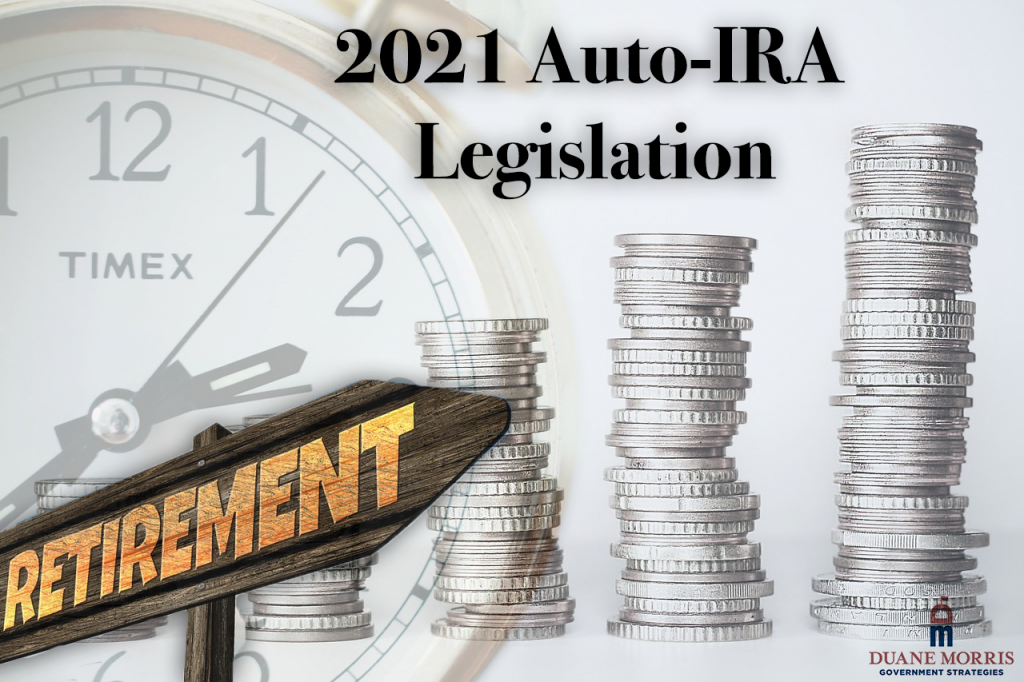
According to a recent Pew report, at least 1/4 of nongovernmental, nonagricultural, full-time U.S. workers do not have access to an employer-sponsored retirement plan. The report also found that fewer than 15% of U.S. households contribute to an individual retirement account (IRA). State lawmakers across the country have noticed the lack of retirement accounts and savings. Lawmakers are increasingly considering implementing or introducing automatic enrollment payroll deduction IRA (auto-IRA) legislation. Under a government-sponsored auto-IRA program, workers without an employer-provided retirement plan would be automatically enrolled. Workers could contribute a preset percentage of their wages or salaries.
As of December 2020, Illinois, California, and Oregon had auto-IRA programs administered by each state. Connecticut, Colorado, and Maryland are in the process of signing up employers for auto-IRA programs this year. Several other states have introduced auto-IRA legislation in 2021.
Delaware EARNS Program
Delaware lawmakers introduced House Bill 205 on May 20. The bill would establish the Delaware Expanding Access for Retirement and Necessary Saving (EARNS) program. The program would serve as the vehicle through which eligible employees could voluntarily provide additional retirement security through a state-facilitated retirement savings program.
According to the bill’s synopsis, the EARNS program would be designed for small businesses that cannot offer retirement plans to their employees because of such plans’ cost and administrative burden.
New York Auto-IRA Legislation Passes Assembly
The New York State Assembly passed A03213A on May 11. The bill would create a self-sufficient retirement savings program in the form of an auto-IRA through the New York Secure Choice Savings Program. The program, which created a state-administered retirement savings plan for employees working for companies who do not offer retirement plans, was created in the FY 2018 –2019 state budget.
The auto-IRA legislation would automatically enroll employees into the program. It would have the option to opt-out after they have been enrolled. The bill is expected to pass the State Senate as well.
At the local level, New York City Mayor Bill de Blasio signed a new law on May 11, creating a mandatory auto-IRA program for employees of private-sector employers who do not offer a retirement plan and employ five or more employees. Under the bill, the default employee contribution rate would be 5%. Employees could adjust that rate up or down up to the annual IRA maximum of $6,000 (or $7,000 if age 50 or above) or opt-out at any time. Further, the plan will be portable; employees may continue to contribute or roll over their accounts into other retirement savings plans when they switch jobs.
Oklahoma Auto-IRA Legislation: the Oklahoma Sooner Choice Act
Two auto-IRA bills were introduced in the Oklahoma legislature this year: HB 2302 and SB 527.
SB 527, which saw some committee action in February and early March, would create the Oklahoma Sooner Choice Act. Under the bill, any private employer and its employees could participate in an automatic enrollment payroll deduction individual retirement account.
The Senate auto-IRA bill further stipulates that the new program would be administered by the newly created Oklahoma Sooner Choice Trust Board, who must operate the program “in a manner that prudently invests the retirement funds in a manner consistent with best practices, maximizes participation and savings, maintains simplicity, ensures the portability of benefits, and provides for the deaccumulation of enrollee assets in a manner that maximizes financial security.” The minimum contribution rate of a covered employee would be 3% under the bill, which is also the default contribution rate.
HB 2302 would create a similar program called the Oklahoma Prosperity Act Program.
Virginia Auto-IRA Legislation Signed This Year
In the 2021 legislative session and Special Session, Virginia lawmakers considered HB 2174, which Governor Ralph Northam signed on April 15. The bill creates the VirginiaSaves Program, a state-facilitated auto-IRA program.
Under the bill, eligible employers include any nongovernmental employer that employs 25 or more eligible employees and does not offer a qualified retirement plan for their employees. Eligible employees are individuals employed at least 30 hours per week. Employers must enroll eligible employees unless the employee elects not to participate. The program will begin enrolling eligible employers on July 1, 2023.
Latest News
Photo credit: iStock.com/Funtap As cryptocurrency continues to shape global financial systems, U.S. states are increasingly introducing legislation to regulate its use. From allowing payments in digital currencies to banning cryptocurrency ATMs, state governments are focusing [...]
photo credit: iStock.com/designer491 According to the National Center for Education Statistics, “Property taxes contribute 30% or more of total public-school funding in 29 states.” However, using property tax income to fund public schools can be [...]
Film strip in perspective. 3D isometric film strip. Cinema Background. Template cinema festival or presentation with place for your text. Movie time and entertainment concept. Vector illustration The Georgia film tax credit was designed to [...]
Photo credit: iStock.com/TU IS New Hampshire Executive Order Background In February 2022, New Hampshire Governor Chris Sununu (R) issued Executive Order 2022-1, establishing the Governor’s Commission on Cryptocurrencies and Digital Assets. The order noted that [...]






Stay In Touch